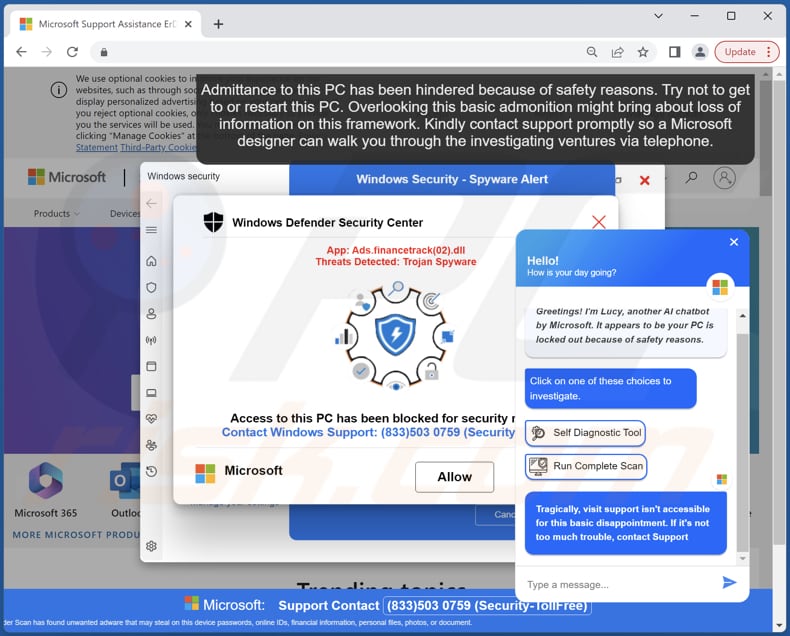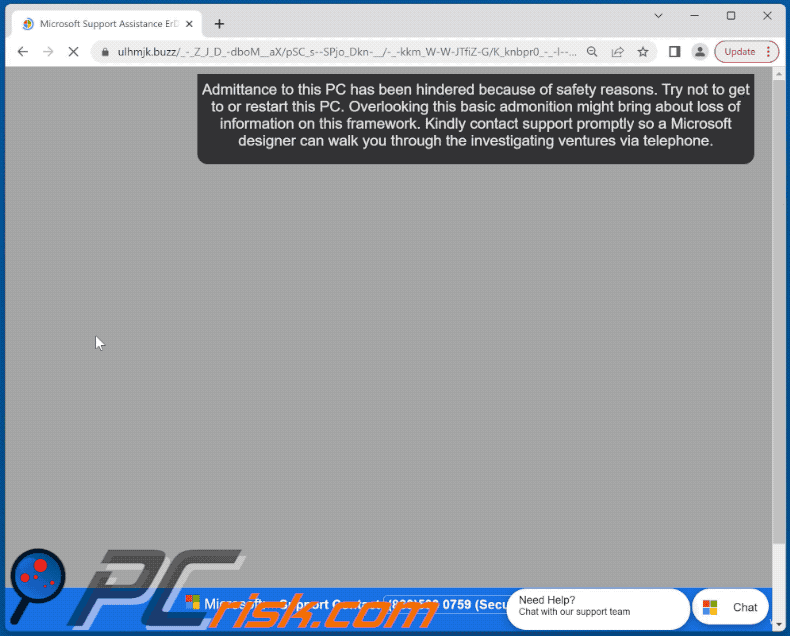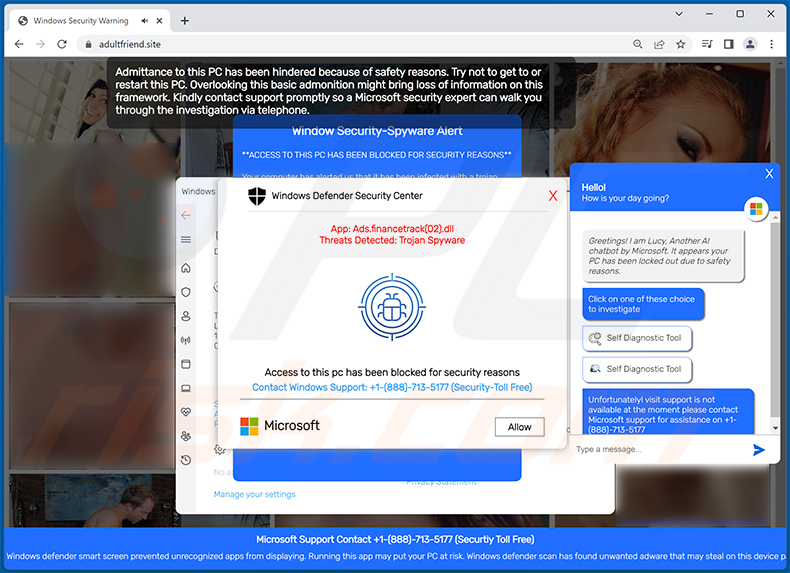How to spot scams like "Admittance To This PC Has Been Hindered" pop-up scam
Phishing/ScamAlso Known As: Admittance To This PC Has Been Hindered technical support scam
Get free scan and check if your device is infected.
Remove it nowTo use full-featured product, you have to purchase a license for Combo Cleaner. Seven days free trial available. Combo Cleaner is owned and operated by RCS LT, the parent company of PCRisk.com.
What is "Admittance To This PC Has Been Hindered"?
After examining this scam, we learned that its purpose is to trick unsuspecting users into calling a fake technical support number. The page running this scam shows multiple deceptive messages claiming that a computer is infected and urging to contact "Windows Support". Users should ignore this scam.

"Admittance To This PC Has Been Hindered" in detail
Fake messages on this scam website indicate that visitors are not allowed to access or restart their computers due to safety reasons. They claim that ignoring this warning could potentially result in the loss of data on the system. Visitors are advised to contact support immediately so that a Microsoft technician can assist them in troubleshooting the issue over the phone.
This is a typical technical support scam. Typically, scammers behind these scams pose as legitimate technical support representatives and attempt to deceive users into providing access to their computers or paying for unnecessary services.
These scams often involve unsolicited phone calls or pop-up messages on computers claiming that computers are infected with viruses or malware. Scammers instruct users to provide remote access to their computers, allowing scammers to install malware or steal personal information.
A couple examples of scams where fraudsters use legitimate remote administration tools to trick users into providing remote access to computers are TeamViewer scam and UltraViewer scam.
In some cases, scammers may offer to provide technical support services for a fee, claiming that computers require urgent repairs or upgrades. They may also use scare tactics, such as threatening to disable computers or Internet access, in order to pressure users into paying for unnecessary services or providing personal information.
| Name | Admittance To This PC Has Been Hindered technical support scam |
| Threat Type | Phishing, Scam, Social Engineering, Fraud |
| Fake Claim | Computer is infected |
| Disguise | Virus warning from Microsoft/Windows Defender |
| Tech Support Scammer Phone Number | (833)5030759, +1-(888)-713-5177 |
| Related Domain | ulhmjk[.]buzz, adultfriend[.]site, adultfriend[.]online |
| Detection Names (ulhmjk[.]buzz) | Forcepoint ThreatSeeker (Suspicious), Google Safebrowsing (Phishing), Seclookup (Malicious), Full List Of Detections (VirusTotal) |
| Serving IP Address | 104.21.44.17 |
| Symptoms | Fake error messages, fake system warnings, pop-up errors, hoax computer scan. |
| Distribution methods | Compromised websites, rogue online pop-up ads, potentially unwanted applications. |
| Damage | Loss of sensitive private information, monetary loss, identity theft, possible malware infections. |
| Malware Removal (Windows) |
To eliminate possible malware infections, scan your computer with legitimate antivirus software. Our security researchers recommend using Combo Cleaner. Download Combo CleanerTo use full-featured product, you have to purchase a license for Combo Cleaner. 7 days free trial available. Combo Cleaner is owned and operated by RCS LT, the parent company of PCRisk.com. |
Similar scams in general
Technical support scams are a type of fraud where scammers pose as technical support representatives and try to trick victims into providing access to their computer or paying for unnecessary services.
It is important to note that legitimate technical support companies will never contact you unsolicited or ask for remote access to your computer unless you have specifically requested their assistance. They will also never ask for payment over the phone or ask you to provide personal information.
Examples of similar scams are "Ads.financetrack(1).exe", "Windows Firewall Protection Alert", and "Your Windows Got Corrupted Due To Virus".
How did I open a scam website
Scammers may use phishing emails or social media posts to trick users into clicking on a link that takes them to a fake technical support website. Also, some types of malware may redirect users to fake technical support websites or generate pop-up messages that mimic legitimate technical support alerts.
In other cases, some websites that are not secure may contain links or pop-ups that lead to technical support scam sites. As a rule, users open scam websites unintentionally.
How to avoid visiting scam pages?
Stay vigilant while browsing online, as deceptive and malicious content can often appear legitimate and harmless. Avoid visiting illegal movie streaming sites, torrent pages, and similar websites. Do not trust ads on suspicious sites or allow websites of this kind to show notifications. Download apps from reliable sources such as official websites and verified stores.
If your computer is already infected with unwanted apps, we recommend running a scan with Combo Cleaner Antivirus for Windows to automatically eliminate them.
The appearance of "Admittance To This PC Has Been Hindered" pop-up scam (GIF):

Message displayed on this page:
Admittance to this PC has been hindered because of safety reasons. Try not to get to or restart this PC. Overlooking this basic admonition might bring about loss of information on this framework. Kindly contact support promptly so a Microsoft designer can walk you through the investigating ventures via telephone.
Another appearance of "Admittance To This PC Has Been Hindered" pop-up scam, designed to display adult content in the background:

Instant automatic malware removal:
Manual threat removal might be a lengthy and complicated process that requires advanced IT skills. Combo Cleaner is a professional automatic malware removal tool that is recommended to get rid of malware. Download it by clicking the button below:
DOWNLOAD Combo CleanerBy downloading any software listed on this website you agree to our Privacy Policy and Terms of Use. To use full-featured product, you have to purchase a license for Combo Cleaner. 7 days free trial available. Combo Cleaner is owned and operated by RCS LT, the parent company of PCRisk.com.
Quick menu:
- What is Admittance To This PC Has Been Hindered technical support scam?
- How to identify a pop-up scam?
- How do pop-up scams work?
- How to remove fake pop-ups?
- How to prevent fake pop-ups?
- What to do if you fell for a pop-up scam?
How to identify a pop-up scam?
Pop-up windows with various fake messages are a common type of lures cybercriminals use. They collect sensitive personal data, trick Internet users into calling fake tech support numbers, subscribe to useless online services, invest in shady cryptocurrency schemes, etc.
While in the majority of cases these pop-ups don't infect users' devices with malware, they can cause direct monetary loss or could result in identity theft.
Cybercriminals strive to create their rogue pop-up windows to look trustworthy, however, scams typically have the following characteristics:
- Spelling mistakes and non-professional images - Closely inspect the information displayed in a pop-up. Spelling mistakes and unprofessional images could be a sign of a scam.
- Sense of urgency - Countdown timer with a couple of minutes on it, asking you to enter your personal information or subscribe to some online service.
- Statements that you won something - If you haven't participated in a lottery, online competition, etc., and you see a pop-up window stating that you won.
- Computer or mobile device scan - A pop-up window that scans your device and informs of detected issues - is undoubtedly a scam; webpages cannot perform such actions.
- Exclusivity - Pop-up windows stating that only you are given secret access to a financial scheme that can quickly make you rich.
Example of a pop-up scam:

How do pop-up scams work?
Cybercriminals and deceptive marketers usually use various advertising networks, search engine poisoning techniques, and shady websites to generate traffic to their pop-ups. Users land on their online lures after clicking on fake download buttons, using a torrent website, or simply clicking on an Internet search engine result.
Based on users' location and device information, they are presented with a scam pop-up. Lures presented in such pop-ups range from get-rich-quick schemes to fake virus scans.
How to remove fake pop-ups?
In most cases, pop-up scams do not infect users' devices with malware. If you encountered a scam pop-up, simply closing it should be enough. In some cases scam, pop-ups may be hard to close; in such cases - close your Internet browser and restart it.
In extremely rare cases, you might need to reset your Internet browser. For this, use our instructions explaining how to reset Internet browser settings.
How to prevent fake pop-ups?
To prevent seeing pop-up scams, you should visit only reputable websites. Torrent, Crack, free online movie streaming, YouTube video download, and other websites of similar reputation commonly redirect Internet users to pop-up scams.
To minimize the risk of encountering pop-up scams, you should keep your Internet browsers up-to-date and use reputable anti-malware application. For this purpose, we recommend Combo Cleaner Antivirus for Windows.
What to do if you fell for a pop-up scam?
This depends on the type of scam that you fell for. Most commonly, pop-up scams try to trick users into sending money, giving away personal information, or giving access to one's device.
- If you sent money to scammers: You should contact your financial institution and explain that you were scammed. If informed promptly, there's a chance to get your money back.
- If you gave away your personal information: You should change your passwords and enable two-factor authentication in all online services that you use. Visit Federal Trade Commission to report identity theft and get personalized recovery steps.
- If you let scammers connect to your device: You should scan your computer with reputable anti-malware (we recommend Combo Cleaner Antivirus for Windows) - cyber criminals could have planted trojans, keyloggers, and other malware, don't use your computer until removing possible threats.
- Help other Internet users: report Internet scams to Federal Trade Commission.
Frequently Asked Questions (FAQ)
What is a pop-up scam?
A pop-up scam is a type of online fraud that involves the use of pop-up windows that appear on a user's screen when browsing the internet. These pop-ups are designed to look like legitimate alerts or error messages from the user's computer or a trusted website.
What is the purpose of a pop-up scam?
In most cases, these scams are used to trick users into paying for unnecessary services or providing access to their computers.
Why do I encounter fake pop-ups?
Users encounter fake pop-ups by clicking shady ads, visiting untrustworthy websites, installing harmful applications, or in simlar ways.
Will Combo Cleaner protect me from pop-up scams?
Combo Cleaner is designed to perform scans on every website that you visit, including those that may contain malicious content, such as pop-up scam sites. If any such site is detected, you will receive an immediate warning, and access to the site will be restricted.
Share:

Tomas Meskauskas
Expert security researcher, professional malware analyst
I am passionate about computer security and technology. I have an experience of over 10 years working in various companies related to computer technical issue solving and Internet security. I have been working as an author and editor for pcrisk.com since 2010. Follow me on Twitter and LinkedIn to stay informed about the latest online security threats.
PCrisk security portal is brought by a company RCS LT.
Joined forces of security researchers help educate computer users about the latest online security threats. More information about the company RCS LT.
Our malware removal guides are free. However, if you want to support us you can send us a donation.
DonatePCrisk security portal is brought by a company RCS LT.
Joined forces of security researchers help educate computer users about the latest online security threats. More information about the company RCS LT.
Our malware removal guides are free. However, if you want to support us you can send us a donation.
Donate
▼ Show Discussion